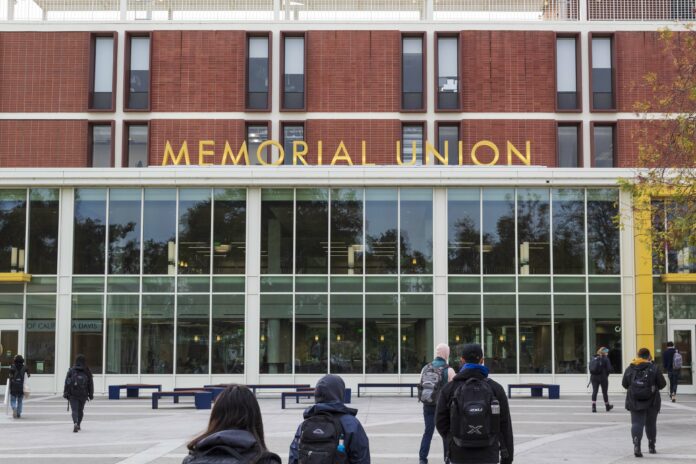Millions from emergency reserves, government acts, Basic Needs and Services Referendum to offset losses
ASUCD is projected to face $1.1 million in losses due to the COVID-19 pandemic if the campus does not reopen for Fall Quarter 2020, according to ASUCD Controller Kevin Rotenkolber.
ASUCD Business Manager Greg Ortiz and Rotenkolber, who is responsible for securing the financial stability and solvency of the association for the future, have suspended each unit’s access to its budget line items until further notice — unless exempted by Rotenkolber or Ortiz —in order to mitigate losses until they are able to determine the exact financial impact of the pandemic. Once the exact amount of financial loss is determined, the ASUCD management team will decide how to cover it, pending Senate approval.
“As far as putting a number to the financial impact, it is still too early to know for sure what the impact will be,” Rotenkolber said. “After consulting with [Associate Vice Chancellor for Health, Wellness and Divisional Resources] Cory Vu and Budget Manager Luci Schmidl, we came to a preliminary estimate for the financial impact on ASUCD’s bottom line: approximately $1.1 million dollars. This number may change depending on the duration of the campus’ switch to remote instruction and the shelter-in-place Order, as well as spending decisions made between now and then.”
Rotenkolber said the $1.1 million estimate is the result of ASUCD planning for the worst while hoping for the best. The UC Davis administration has not yet made a decision on whether Fall Quarter 2020 will take place remotely. A few universities, including Cal State Fullerton, have already announced plans to hold fall instruction online.
Rotenkolber explained that since most ASUCD units are service- or advocacy-based, even business operations such as the CoHo and the Bike Barn are near break-even operations. Virtually all aspects of ASUCD — especially the CoHo, the Bike Barn, Picnic Day and Whole Earth Festival — have been financially impacted by COVID-19.
“In the case of the Bike Barn, until the shelter-in-place order went out and we suspended their operations, they were on track to meet or exceed their income expectations,” Rotenkolber said. “[They] are now projected to fall approximately $105,000 short of pre-COVID-19 expectations. Units like KDVS, Picnic Day and Whole Earth Festival, which all have big events in the Spring that generate almost all of their income in Spring, are more or less projected to bring in almost no income.”
Additionally, the CoHo and its satellite locations, BioBrew and CoHo South, are profitable only four months per year in a normal year, with the two most profitable months being April and May. The high profit made in those four months offsets the cost of the other eight months of the year and allows for the CoHo to serve students year-round. Without income from the CoHo, Rotenkolber expects a significant loss in ASUCD funds.
Ortiz, however, explained that ASUCD has a significant amount of reserves in place to offset financial losses during situations like this, similar to the California wildfires in 2018 that shutdown the campus for over a week. ASUCD lost a significant amount of revenue at that time, as well.
Rotenkolber confirmed that ASUCD has about $2.3 million between three main reserves. He expects to dip into some of these reserves, as well as other smaller unit-specific reserves that could be liquidated to ensure the survival of the units.
The Basic Needs and Services Referendum that passed this past February also allows access to approximately $1.4 million in increased general funds, which will aid in offsetting the costs incurred due to COVID-19.
“We are quite fortunate in that we passed the Basic Needs and Services Referendum when we did because other ASUCs [Associate Students of the University of California] which have their elections in the Spring have been forced to postpone their referendums, whereas we were able to pass it in the 11th hour,” Rotenkolber said.
Unitrans, a unit of ASUCD that is not funded through ASUCD’s general fund but instead through student fees and city grants, also has its own budgetary reserve to mitigate some of the lost revenue. Unitrans is operating fare-free until further notice to reduce customer contact with bus drivers and conductors and to support customers whose finances may be negatively impacted by COVID-19.
“Through the recently signed into law $2 trillion Federal Coronavirus Aid, Relief and Economic Security (CARES) Act, Unitrans can get reimbursed for lost fare revenue due to coronavirus impacts,” said Unitrans General Manager Jeffrey Flynn. “The CARES Act provides specific funding opportunities to public transit operators like Unitrans.
Flynn explained that Unitrans will experience financial impacts if gasoline taxes or student fees decrease, as they are tied to city grants and enrollment respectively. Therefore, Flynn said he is uncertain at this time how much revenue will fall and how much alternative revenue may be needed to avoid service reductions.
“We’re closely monitoring ridership, our finances and county, city and university plans, but at this time, we don’t know the full extent of the short- and long-term impacts of the COVID-19 situation,” Flynn said.
Although some services may experience budget cuts to adjust for financial losses, ASUCD is able to prevent the dissolution of any departments, units and committees.
“With the Basic Needs and Services Referendum, careful planning and intelligent decision-making, I am confident that ASUCD will survive this pandemic as we have [survived] for the past 105 years,” Rotenkolber said.
Written by: Graschelle Fariñas Hipolito — campus@theaggie.org









